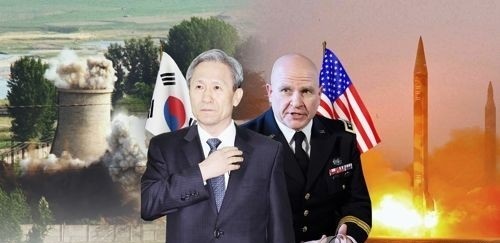The security chiefs of Seoul and Washington discussed the ongoing "smooth" installation of a US missile defense battery in South Korea on Thursday, a day after some of its key components were delivered to the deployment site in a southeastern county.
National Security Office chief Kim Kwan-jin and his US counterpart H.R. McMaster held a 25-minute telephone conversation over the deployment of a Terminal High-Altitude Area Defense system and other security issues, Seoul's presidential office said in a press release. The talks began at 9 a.m. (Korea time).
 |
This image shows South Korea's National Security Office chief Kim Kwan-jin (left) and his US counterpart H. R. McMaster. (Yonhap) |
"The two sides evaluated that the US Forces Korea's deployment of THAAD is proceeding smoothly in the face of North Korea's provocative threats, and agreed to further strengthen our military readiness posture through a robust South Korea-US alliance," the press release reads.
On Wednesday, the US military brought radar and other equipment to Seongju, 296 kilometers southeast of Seoul in what critics say was a hurried move ahead of the May 9 presidential election here.
Adm. Harry Harris, commander of the US Pacific Command, told a US parliamentary session that the THAAD battery will become operational "in the coming days."
Kim and McMaster also agreed that in close cooperation with the international community, the allies will continue strong sanctions and pressure on the North to change its strategic calculus on its nuclear program and deter its future provocations.
"(The allies) agreed to promptly push for intolerable punitive measures against the North, including a new UN Security Council resolution, should it press ahead with its strategic provocation," the press release said.
Pyongyang has recently been ratcheting up tensions with its unrelenting saber-rattling, including a failed ballistic missile launch earlier this month and a massive artillery exercise earlier this week. The reclusive state is also seen preparing for another nuclear test. (Yonhap)







![[Today’s K-pop] Blackpink’s Jennie, Lisa invited to Coachella as solo acts](http://res.heraldm.com/phpwas/restmb_idxmake.php?idx=644&simg=/content/image/2024/11/21/20241121050099_0.jpg)
